Rod Miller's Blog, page 26
May 20, 2017
My Favorite Book, Part 8.
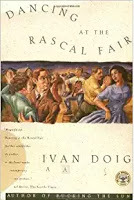
When Ivan Doig died in 2015, we lost one of our best Western authors. Doig wrote a number of books and I’m pretty sure I’ve read them all. Several of them are listed among my favorites, including English Creek, Bucking the Sun, Mountain Time, The Bartender's Tale, and Last Bus to Wisdom. But the one I find myself re-reading most often is Dancing at the Rascal Fair. It is the middle book of Doig’s trilogy featuring the McCaskill family but, chronologically speaking, it is the first story. Set at the tail end of the nineteenth century in the Two Medicine country of northern Montana, it introduces Angus McCaskill, who emigrates from Scotland with this friend Rob Barclay. It follows the men over some three decades as they build sheep ranches on the Montana frontier. They fight the elements, illness, and, at times, each other. You’ll find adventure, violence, and romance in the pages of this remarkable book as it presents a realistic, hard-eyed look at life in the frontier West. If you haven’t read Ivan Doig, it’s not too late to fill the gap.
Published on May 20, 2017 06:31
May 12, 2017
Another one bites the dust.
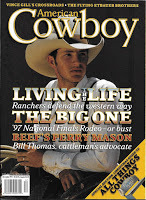
American Cowboy magazine announced recently that they are drawing the shades, pulling the plug, turning out the lights, blowing out the candle, locking the doors, pulling in the latchstring, folding their tent, spooling their bedroll, and selling their saddle. The June/July 2017 issue will be the last. Jesse Mullins edited the magazine for its first 18 years, and under his hand it became, I believe, the best of the publications for aficionados of the modern-day American West. The magazine was never the same after being bought up by a big corporation and the ouster of Jesse. The first of my poems to ever see print was in the pages of American Cowboy back in December 1997 (that’s the cover, above) and many others followed. Jesse assigned me a lot of articles from around about 2002 through 2011. Along the way I interviewed a governor, some entertainers, rodeo champions, writers, artists, and other interesting people. I didn’t write much for subsequent editors of the magazine, outside of an opinion piece in a 2015 issue. It is safe to say that much of the success I have enjoyed as a writer stems from Jesse’s acceptance of that first poem and his support over the years. So, thank you, Jesse Mullins. And thank you, American Cowboy. Requiesce in pace.
Published on May 12, 2017 07:12
May 4, 2017
Lies They Tell Writers, Part 38: You, too, can be a best-selling author.

We once addressed the “lie” that nobody reads anymore. The fact is, people are reading. Which brings up the question many (most) writers ask: “Why aren’t they reading my books?” The question persists, despite the many times writers (including me) have been shoveled tons of advice at workshops and conferences and elsewhere about how to become a best-selling author. It can happen. It does happen. But, like most good fortune in life, the odds are against you. A writer friend of mine who had a novel turned into an Academy Award-winning movie likened that success to “being struck by benevolent lightning.” The fact is, lightning may not strike you. Or me. Here are several million reasons why. Berrett-Koehler Publishers (a company I know nothing about or have any connection with) compiled some telling statistics about books and publishing from several sources. I’ve borrowed from their work here. Of late, traditional publishers are cranking out about 300,000 books a year. Last year, some 700,000 books were self-published by their authors. That’s a million brand new books. And that’s on top of 13 million existing books still on the market, with more added every year. So your new book (and mine) is competing for attention with at least 14 million other books. There are things you can do—or try—to get noticed. And you’ll likely sell some books. Chances are, you might sell enough be invited to speak at a writers conference and tell other writers how they can be a best-selling author like you. I’ve been invited to speak at many writers conferences—but never, ever, on that topic. Maybe someday.
Published on May 04, 2017 09:03
April 26, 2017
Porter Rockwell pulls the trigger in True West.
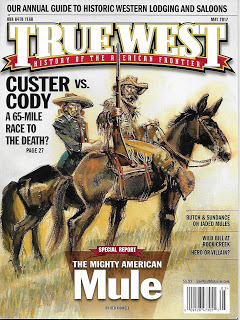
The latest issue of True West magazine (May 2017) is on newsstands. Most fans of the Old West are familiar with this colorful, lively publication that chronicles all kinds of people and events from our history. In this issue you’ll find “Utah Bloodbath,” an article I wrote about Porter Rockwell’s pursuit and shooting of Lot Huntington, and the suspicious deaths of Huntington’s partners in crime after Rockwell turned them over to the Salt Lake City police. Robbery, horse stealing, and the brutal beating of Utah’s governor all led up to the shootout and are reported in the story. As is usually the case with history, many details are sketchy and accounts differ. But the article attempts to present events as recorded in contemporary sources. Porter Rockwell was one of the Western frontier’s most feared and respected gunmen, but his place in history in no way reflects his fame and infamy in his day. Perhaps this article in this influential magazine will help bolster his memory.
Published on April 26, 2017 07:28
April 19, 2017
“Spring into Books” 2017.
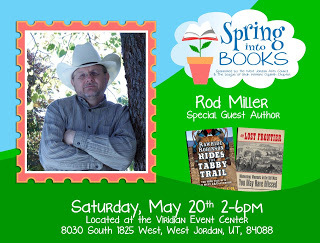
Book lovers who live along the Wasatch Front here in Utah are in for a treat. The Salt Lake County Library System’s “Spring into Books” event is on the horizon. Dozens of authors (including yours truly) will be on hand, offering reading for all ages and all interests. There will also be workshops, readings, fun and games, and other activities. If you’re in the area, join us Saturday, May 20 from 2:00 to 6:00 p.m at the Viridian Event Center in West Jordan. Otherwise, find my books online at writerRodMiller.comfor good reading this spring, summer, or any season.
Published on April 19, 2017 11:17
April 8, 2017
Was Mark Twain right?

There’s a quotation (that comes in several versions) attributed (without supporting evidence) to the great Western writer Mark Twain: “I don’t give a damn for a man that can only spell a word one way.” It seems that attitude is becoming popular among American writers. As a sometimes book reviewer and writing contest judge, I read a lot of books. And more and more, I find a lot of editing errors. Punctuation is often sloppy. Sentence construction is sometimes unfathomable. Word choice questionable. And correct spelling overlooked. Letters in a word might be inverted. A related—but wrong—word form might be used. A homonym might be used in place of the correct word. Occasionally I come across a word that is correctly spelled but is the altogether wrong word—not a homonym, exactly, but sometimes it’s a word close enough to what the author intended that I can figure out what it should be. I find such easy-to-correct errors in traditionally published books, but rarely. They appear more often in books from small publishers. But they appear most often in self-published books. Sometimes, in self-published books in which the author acknowledges an editor or proofreader or both. They should ask for a refund. But, really, they should fix these things themselves. Everybody makes mistakes, and errors have a way of slipping through. There is no excuse, however, for outright sloppiness. Spell checkers help, but can’t flag a correctly spelled word used incorrectly. Use a dictionary if you’re not absolutely sure. It only takes a minute. Simple spelling errors should be as rare as hen’s teeth in a published book. Truth be told, out of respect for readers they should be just as rare in online postings, emails, letters, and everything we write—but that may be too much to ask. Especially in a time when pointing out online mistakes creates furor and derision.If you believe the aforementioned quotation attributed to Mark Twain, he would be delighted with the current state of affairs when it comes to spelling.But I doubt it.
Published on April 08, 2017 05:57
March 26, 2017
Lies They Tell Writers, Part 37: Two (or three or six) heads are better than one.

There’s a term in vogue among writers these days: beta reader. I don’t know where the phrase originated or why (or what they used to call it), but all it means is that someone (or several someones) is reading a manuscript you intend to publish, or submit to a publisher. Sometimes a “beta reader” is a spouse or another family member. Sometimes a friend. Sometimes a colleague from a critique group or other writing organization. Sometimes all of the above, or someone else altogether. The idea behind beta readers is the notion that two heads are better than one—that they will point out pitfalls in your plot, cracks in your characters, lapses in logic, problems with prose, and so on, and perhaps offer advice on repairs. Things, it seems to me, a writer ought to find and fix while writing and rewriting. But many writers find beta readers helpful. On occasion I have been asked to be a beta reader but I doubt I was of much use since all I can offer is my opinion, which may be at odds with what the writer thinks. In the interest of full disclosure, I confess that I don’t use beta readers. Here’s why. First of all, the people I want reading my manuscripts are publishers and editors. People whose opinions really count, in numbers preceded by dollar signs. Next, as mentioned earlier, any glaring weaknesses in a manuscript should have been found and fixed already, by me. (Or not, which may well be the case.)Sometimes, comments and criticism are more related to style than substance, and style ought to be the writer’s province. The advice offered may not be bad—but it may not be good, either. You could do something a different way based on their advice, but different may just be different—not better.Also, readers have differing opinions, so the advice of one is sometimes at odds with the advice of another—even downright contradictory. Most of all, I suppose, there’s the question of who’s right and who’s wrong. Criticism from beta readers may lead to your doubting your work, even your ability. When you set out to write this thing, you must have believed you could do it. You can’t let someone who has no horse in the race convince you otherwise. As the late, great author Kent Haruf once said: “You have to believe in yourself despite the evidence.”It’s all up to you, of course. Use beta readers if it helps. Maybe two heads are better than one. On the other hand, it could be equally true that too many cooks spoil the broth.
Published on March 26, 2017 11:32
March 16, 2017
My Favorite Book, Part 7
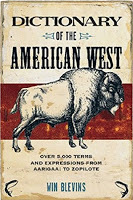
Win Blevins appears on my list as author of a couple of my favorite novels. But while filled with interesting short stories, this book is nonfiction. The Dictionary of the American West includes definitions and explanations of “Over 5,000 terms and expressions from Aarigaa to Zopilote.” It not only makes for enjoyable browsing, it is a handy reference, always at hand on the shelf next to my desk.I also use and enjoy Ramon Adams’s Western Words, but while that book covers cowboy lingo well, the Dictionary of the American West is broader in its scope, including language from other subcultures, including mountain men, miners, Indian tribes, fishermen, Hispanics, and on and on. While better known as a Western Writers Hall of Fame author of fiction—and you’ll see him here again for that—today Win Blevins earns a place on my list of favorite books for this important work of nonfiction and history and lexicography.
Published on March 16, 2017 11:15
March 5, 2017
Join the fight to rescue the Apostrophe.
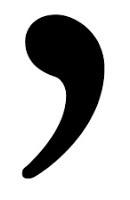
The apostrophe is a handy little punctuation mark that does two (and only two) jobs in writing: it shows ownership in possessive words, and it indicates missing letters in contractions.For some reason, this simple little mark is widely misused and abused. A lot. Perhaps as often as it’s used correctly. Many, many people seems to believe apostrophes belong in plurals. (They would write plural’s instead of plurals.) As annoying as that habit is, we’ll let it go. For now. This particular rant revolves around what is often the correct use of the apostrophe, but with the incorrect punctuation mark. It happens when writers drop a letter at the beginning of a word, usually when writing vernacular or dialect. (Such as ’bout for about, ’er for her, ’neath for beneath, ’cause for because, ’fore for before—well, you get the idea.)The problem is, I found—with very little looking for examples as I write this—all these contractions printed (or posted) as ‘bout, ‘er, ‘neath, ‘cause, and ‘fore. All using an incorrect punctuation mark.
This: ’is an apostrophe. This: ‘ is not.
You’ll notice the marks bend, or hook, in opposite directions. The one that hooks opposite the apostrophe is the single opening quotation mark, for use when quoted material falls within a larger quotation, such as: “I saw Shorty in town yesterday,” Slim said. “He gave me a tip of the hat and said ‘howdy’ but that was all.”Blame it on word processing programs. But writers share the blame when they don’t fix it. When you hit the appropriate key at the beginning of a word, the single opening quotation mark appears on the screen, rather than the apostrophe that appears if you hit the same key within a word. Computers don’t know any better. Writers should. There are two ways to fix it; both are simple, one more so than the other. You can fix it by finding a proper apostrophe elsewhere in your writing and copying and pasting it at the beginning of your contracted word. Or, easier still, you can hit the key twice—that will give you a single opening quotation mark followed by an apostrophe (or single closing quotation mark). Then, delete the wrong one and you’re correct. “Big deal,” I hear you saying (perhaps with a crude adjective between those two words). Maybe you’re right. But the more we allow little lapses in communication—which is what punctuation is all about in the first place—the more accepting we are of bigger and more serious lapses. Before you know, it’s all gobbledygook. Too much writing comes out that way, anyway.
Published on March 05, 2017 16:21
February 23, 2017
“And the River Ran Red” debut performance.
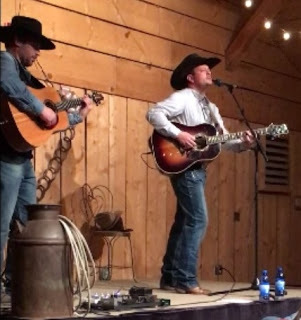
Not long ago, singer and songwriter extraordinaire Brenn Hill debuted “And the River Ran Red,” a song I had the good fortune to help write. As I’ve said before, writing a song is a strange undertaking for me, as I couldn’t carry a tune with a packsaddle. But, thanks to Brenn, I think it’s a damn fine song.Based on the tragic events of the 1863 Bear River Massacre, where US Army troops slaughtered some 300 Shoshoni men, women, and children, the song adds to a list of my writings on the subject, which include a nonfiction book, Massacre at Bear River: First, Worst, Forgotten and a chapter in The Lost Frontier: Momentous Moments in the Old West You May Have Missed , as well as some short stories and poems. Brenn Hill performed the song for the first time at the American West Heritage Center in Cache Valley, just 36 miles from the massacre site, on 10 and 11 April 2017. See a cell phone video of the performance on YouTube.
Published on February 23, 2017 05:39



